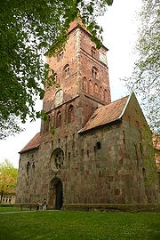
Wildeshausen
Overview
Oldenburg (district)
Oldenburg is a district in Lower Saxony, Germany. It is bounded by the districts of Diepholz, Vechta, Cloppenburg and Ammerland, the city of Oldenburg, the district of Wesermarsch and the city of Delmenhorst.-History:...
in Lower Saxony
Lower Saxony
Lower Saxony is a German state situated in north-western Germany and is second in area and fourth in population among the sixteen states of Germany...
, Germany
Germany
Germany , officially the Federal Republic of Germany , is a federal parliamentary republic in Europe. The country consists of 16 states while the capital and largest city is Berlin. Germany covers an area of 357,021 km2 and has a largely temperate seasonal climate...
. It is situated by the river Hunte
Hunte
The Hunte is a 189 km long river in north-western Germany , left tributary of the Weser. It rises in the Wiehengebirge hills. In the Northern German Plain it flows through lake Dümmer. It flows generally northwards through the towns Bad Essen, Diepholz, Wildeshausen and Oldenburg. It flows...
.
In 1648, Wildeshausen and the surrounding district was ceded to Sweden
Sweden
Sweden , officially the Kingdom of Sweden , is a Nordic country on the Scandinavian Peninsula in Northern Europe. Sweden borders with Norway and Finland and is connected to Denmark by a bridge-tunnel across the Öresund....
, in the Peace of Westphalia
Peace of Westphalia
The Peace of Westphalia was a series of peace treaties signed between May and October of 1648 in Osnabrück and Münster. These treaties ended the Thirty Years' War in the Holy Roman Empire, and the Eighty Years' War between Spain and the Dutch Republic, with Spain formally recognizing the...
, where it was given as a fief to Gustav Gustavsson af Vasaborg, an illegitimate son of King Gustavus Adolphus, as a part of the Swedish Dominion
Dominions of Sweden
The Dominions of Sweden or Svenska besittningar were territories that historically came under control of the Swedish Crown, but never became fully integrated with Sweden. This generally meant that they were ruled by Governors-General under the Swedish monarch, but within certain limits retained...
of Bremen-Verden
Bremen-Verden
Bremen-Verden, formally the Duchies of Bremen and Verden , were two territories and immediate fiefs of the Holy Roman Empire, which emerged and gained Imperial immediacy in 1180...
. In 1679, following the Treaty of Nijmegen, it was pawned, to the Prince-Bishop of Münster, in exchange for a loan of 100,000 Riksdaler.
The most impressive sights are the many stone monuments, old burial places going back far into the third millennium BC.

